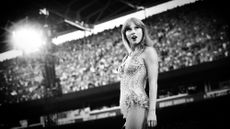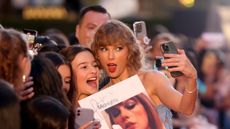A brief, disheartening history of women in late night
Late-night TV has been historically dominated by men, but these women helped the genre evolve


You know late-night could use more diversity when there are two hosts named Jimmy, but no women.
Late-night television has been historically dominated by men, so much so that when Emma Thompson played a female late-night host in "Late Night," she joked that the movie was "basically science fiction."
In 2023, this remains true. But a 30-year-old comedian will soon become the only current female late-night host on network television, following in the footsteps of some trailblazing women.
Subscribe to The Week
Escape your echo chamber. Get the facts behind the news, plus analysis from multiple perspectives.

Sign up for The Week's Free Newsletters
From our morning news briefing to a weekly Good News Newsletter, get the best of The Week delivered directly to your inbox.
From our morning news briefing to a weekly Good News Newsletter, get the best of The Week delivered directly to your inbox.
A Rivers runs through it
The history of women in late-night goes back to the very beginning of the genre.
After all, the "first late night TV talk show" had a female host: Faye Emerson, the University of Wisconsin-Madison's Maureen Mauk told Deadline. Five years before "Tonight Starring Steve Allen" launched on NBC, "The Faye Emerson Show" premiered on CBS in 1949. Emerson was influential for talking about politics, now a staple of late night. But "as television began to evolve, and the sponsors realized how big and important late-night TV could be, women were relegated to daytime television," Mauk explained in CNN's "The Story of Late Night."
Joan Rivers, who began hosting "The Late Show" in 1986, is generally credited as the first female late-night host. The comedian had appeared frequently on Johnny Carson's "The Tonight Show" and became permanent guest host in 1983. But after Rivers learned she was not being considered to be Carson's successor, she went to Fox and became his competitor, leading to a falling out between Rivers and Carson. Fox fired Rivers in 1987 amid poor ratings, replacing her with Arsenio Hall.
Five years later, Whoopi Goldberg launched a syndicated late-night show. It was a sort of "anti-talk show," The New York Times wrote, as there was no studio audience or band and only one guest per episode. But it only lasted a year. In 2000, Cynthia Garrett became the first Black woman to host a network late-night show: NBC's "Later." "I still can't tell you why it was cancelled," she told HuffPost in 2017.
From Chelsea to Taylor
In the 2000s, Wanda Sykes and Mo'Nique launched late-night talk shows on Fox and BET, respectively, but neither lasted long. More successful was E!'s "Chelsea Lately," which Chelsea Handler hosted for seven years. Placing a greater focus on celebrity news, her audience was more female, and younger, than that of most of the other late-night hosts, according to The Hollywood Reporter.
In 2016, Samantha Bee launched TBS' "Full Frontal" after being passed over for Jon Stewart's vacated "Daily Show" hosting job. She was known for her political barbs, including a controversial dig at Ivanka Trump. "Full Frontal" was canceled in 2022 amid what TBS described as a "new programming strategy," and NPR's Eric Deggans decried the "most prominent female voice in late night" being "unceremoniously removed from TV." Lilly Singh became the first Indian, and first openly bisexual, network late-night host in 2019 as NBC launched "A Little Late" at 1:30 a.m. She tweaked the format by pre-taping multiple episodes back-to-back, meaning she focused less on the day's news. Singh later said she had a smaller budget than other late-night shows, so making "A Little Late" was "exhausting."
Meanwhile, Amber Ruffin helped evolve the genre for streaming with Peacock's "The Amber Ruffin Show," which premiered with episodes as short as 19 minutes. On Showtime, Ziwe Fumudoh satirized late night with "Ziwe," making guests squirm with her blunt, pointed questions. But "A Little Late" and "Ziwe" have both ended, and Ruffin's show will reportedly only receive specials going forward. Other female-fronted late-night shows canceled in recent years include BET's "The Rundown with Robin Thede," E!'s "Busy Tonight," Bravo's "Kathy," Netflix's "The Break with Michelle Wolf," and Hulu's "I Love You, America with Sarah Silverman." There are currently no female late-night hosts on network TV.
But that will soon change. CBS has tapped comedian Taylor Tomlinson to host the panel show "After Midnight," taking over James Corden's time slot. She'll be the only female late-night host, though with Trevor Noah's "The Daily Show" gig up for grabs, it's possible that won't be true for long. In fact, Chelsea Handler has expressed interest in returning to the format as permanent "The Daily Show" host.
"There's a dearth of women doing this," Handler told Seth Meyers, adding, "You guys are all great and woke and liberal, and you're all for women’s rights, but we need women up there standing up for us."

Continue reading for free
We hope you're enjoying The Week's refreshingly open-minded journalism.
Subscribed to The Week? Register your account with the same email as your subscription.
Sign up to our 10 Things You Need to Know Today newsletter
A free daily digest of the biggest news stories of the day - and the best features from our website
Brendan has worked as a culture writer at The Week since 2018 covering the entertainment industry, including film reviews, television recaps, awards season, the box office, major movie franchises and Hollywood gossip. He has written about film and television for outlets including Bloody Disgusting, Showbiz Cheat Sheet, Heavy and The Celebrity Cafe.
-
 5 X-plosive cartoons about Elon Musk
5 X-plosive cartoons about Elon MuskCartoons Artists take on his proposed clean-up of X, his views on advertisers, and more
By The Week US Published
-
 2023: the year of superhero fatigue
2023: the year of superhero fatigueThe Explainer The year may represent the end of an era for Hollywood
By Brendan Morrow, The Week US Published
-
 Recipe: roast garlic mushrooms with parsley and eggs by Gelf Alderson
Recipe: roast garlic mushrooms with parsley and eggs by Gelf AldersonThe Week Recommends A simple and classic breakfast combination
By The Week UK Published
-
 2023: the year of superhero fatigue
2023: the year of superhero fatigueThe Explainer The year may represent the end of an era for Hollywood
By Brendan Morrow, The Week US Published
-
 Places that are already seeing a boost in tourism due to climate change
Places that are already seeing a boost in tourism due to climate changeThe Explainer Warmer temperatures are moving travelers north
By Devika Rao, The Week US Published
-
 What is dark tourism?
What is dark tourism?The Explainer Travelers' fascination with the macabre is not new
By Devika Rao, The Week US Published
-
 From 'thunks' to mixed reality, the future of books is interactive
From 'thunks' to mixed reality, the future of books is interactiveThe Explainer What is in store for literature in an increasingly digital world?
By Theara Coleman, The Week US Published
-
 BTS, Taylor Swift and the influence of pop music fans
BTS, Taylor Swift and the influence of pop music fansThe Explainer Swifties and the like have proven they can exert their influence for political and social change
By Brendan Morrow, The Week US Published
-
 The Taylor Swift phenomenon
The Taylor Swift phenomenonThe Explainer How did the 33-year-old pop star build a record-shattering global music empire?
By The Week UK Published
-
 What does 'back to normal' mean for Hollywood now?
What does 'back to normal' mean for Hollywood now?The Explainer The longest strike in SAG-AFTRA history is over. What's next?
By Brendan Morrow, The Week US Published
-
 The dangers of too much caffeine
The dangers of too much caffeineThe Explainer It is possible to overdose on the stimulant
By Devika Rao, The Week US Published









